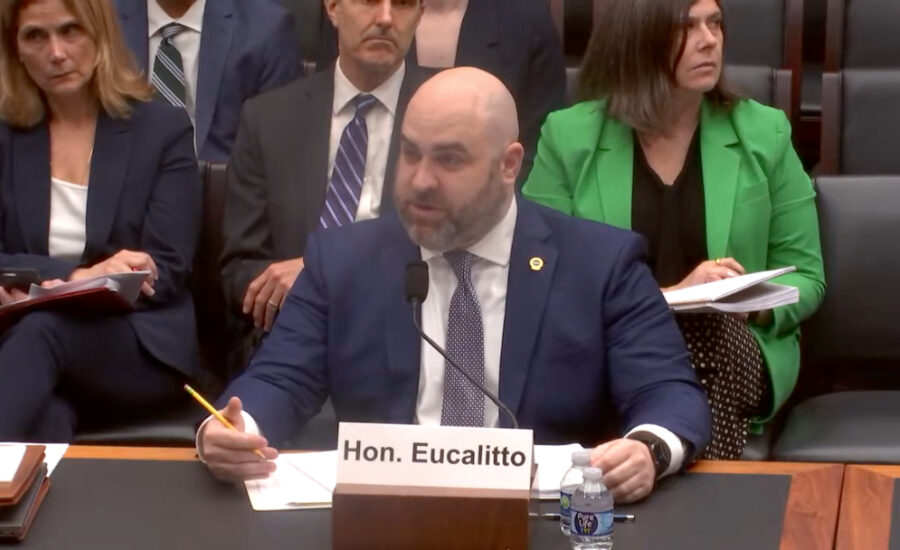
Lawmakers Eye Federal Rail Funding Reform to Support Infrastructure Work

As U.S. Dept. of Transportation officials review a backlog of thousands of awarded-but-unobligated grants, lawmakers in Washington are looking for ways to improve the efficiency and effectiveness of DOT’s rail grants. For rail sector experts who testified before the House railroads, pipelines and hazardous materials subcommittee on May 6, it mostly comes down to ensuring availability of funding and hastening regulatory processes.
“We need reliable, predictable funding to plan decades’ worth of capital improvements,” said Garrett Eucalitto, Connecticut Dept. of Transportation commissioner and American Association of State Highway and Transportation Officials (AASHTO) president. “Fits and starts of funding make it difficult to plan and implement any project.”
Lawmakers should include a dedicated rail title in the next surface transportation reauthorization bill to maintain the momentum of rail infrastructure work enabled by 2021’s Infrastructure Investment and Jobs Act (IIJA), which included $102 billion in federal rail funding, Eucalitto said. The current surface transportation authorization is set to expire at the end of September 2026.
“We need a long-term reauthorization that extends current IIJA funding levels and keeps pace with inflation, all while giving state DOTs the ability to efficiently deliver projects that keep our communities safe and keep our economy moving,” Eucalitto said.
The influx of funding from IIJA came with increased size and complexity of notices of funding opportunity, testified Kevin Hicks, principal and senior vice president at Mechanicsburg, Pa.-based AEC firm Gannett Fleming Transystems and director of the National Railroad Construction & Maintenance Association board. That added complexity has impacted the speed of project selections, on top of grants taking too long to obligate, he added.
Hicks recommended that the Federal Railroad Administration (FRA) further standardize grant applications and make the agreements and scopes of work more template-based. He also suggested consolidating some existing grant programs and breaking out new programs helping fund preliminary engineering separately from those funding final design and construction.
It is also important to ensure sufficient and consistent staffing at FRA, Hicks said. FRA managers need to be experienced and empowered to make decisions. To verify stakeholder concurrence on project plans more quickly, he also recommended FRA require preliminary engineering, cost estimates and stakeholder concurrence with grant applications.
“Numerous factors impact project readiness, and most of these factors are outside of the FRA’s control,” Hicks said. “But the FRA could do more to avoid future delays by having project sponsors better define the status of these factors in advance of obligation.”
Required reviews under the National Environmental Policy Act (NEPA) could also be hastened, several experts who testified said. Hicks said FRA should commit to an expedited timeline for the reviews and eliminate portions that duplicate state-level requirements.
FRA should also require preliminary engineering and NEPA reviews be completed in order for projects to be eligible for funding, Hicks said.
“This would help to ensure that the projects selected for final design and construction are truly ready to be delivered in an acceptable time frame,” he said.
Grant Backlog
While officials are looking at ways to expedite grant processes, U.S. DOT officials are working their way through the backlog of grants that Transportation Secretary Sean Duffy says have not yet been obligated.
Duffy told a Senate committee last month that the backlog included 3,200 grant awards from as far back as 2022. On May 6, DOT announced that it had approved 329 of them, totaling $3.2 billion in grant funds. The re-approved grant awards included 24 from FRA, including six Consolidated Rail Infrastructure and Safety Improvements grants totaling $221 million and 14 Railroad Crossing Elimination grants totaling $25 million, along with a few grants from other programs.
DOT’s reviews are not simply aimed at finalizing awarded grants. Officials have also removed requirements such as greenhouse gas emission reporting and diversity, equity and inclusion goals. And officials are canceling some previously awarded grants, including a $63.9-million grant to Amtrak for a proposed Dallas-Houston high-speed rail line and various transportation-related research grants to universities.
Duffy said in a statement the Biden administration “tied road construction up with red tape and leftist social requirements—adding millions in costs and months of delay—all while our outdated infrastructure sat in disrepair.”
The transportation secretary also sent a letter to all federal transportation funding recipients last month warning them to not set or follow any DEI goals and to cooperate with any U.S. Immigration and Customs Enforcement investigations or risk losing their federal funding.
Post a Comment
You must be logged in to post a comment.





